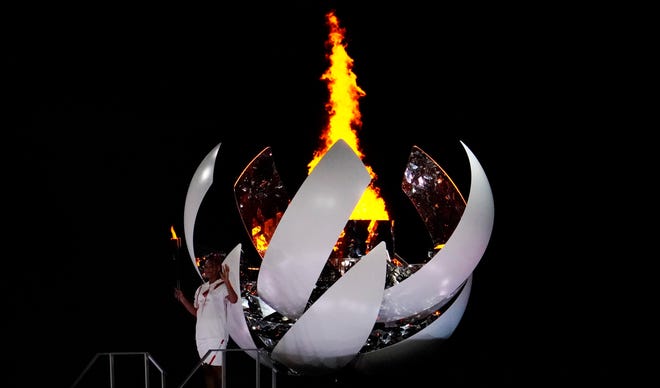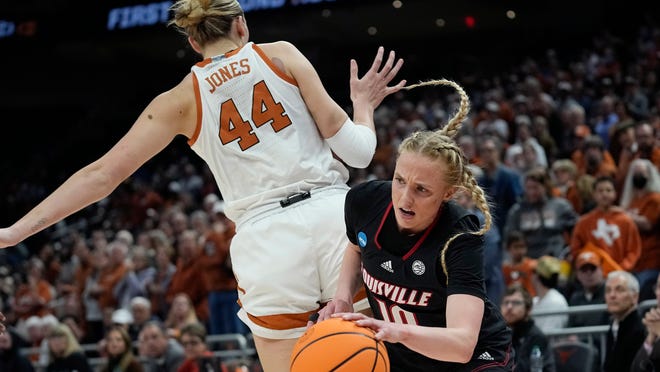
TOKYO — After more than two weeks of competition in 33 sports across 46 disciplines in 43 venues – for a total of 339 medal events – the Tokyo Olympics will formally come to an end Sunday with the closing ceremony.
Conducted one year behind schedule because of the coronavirus pandemic, Japan pulled off these Games despite more than 400 cases connected to the event. However, Tokyo experienced record-high infections as the Games were held here.
The presence of the pandemic highlighted the games. Stadiums and arenas lacked spectators both domestic and foreign. The same will be true Sunday at Olympic Stadium, although it will be a celebration of the athletes who persevered and made these Games possible.
Coverage of the closing ceremony is underway on NBCOlympics.com and will re-air on tape delay in primetime (8-11 p.m. ET) on NBC.
Follow along with updates from inside the stadium.

'WE CAN DO IT ALL': Olympics' female stars inspire women around the world
WELCOME HOME. NOW QUARANTINE:Some athletes will quarantine for two weeks after returning from Olympics
TEAM USA MEDAL COUNT:Which events did the USA capture a medal? Here's the full list.
While the Games have come to an end, the abbreviated quadrennial is just beginning and event organizers are already looking ahead to the 2024 Paris Olympics.
To close the Tokyo Games, the Olympic flag will be lowered by representatives of the Self-Defense Forces while Japanese soprano vocalist Tomotaka Okamoto performs the Olympic anthem.
After the flag is lowered, Tokyo governor Yuriko Koike and Paris mayor Anne Hidalgo will join IOC President Thomas Bach for the Olympic flag handover ceremony.
On the center stage, Koike will hand the Olympic flag to Bach, who will then pass it on to Hidalgo. For the next three years, the Olympic flag will be displayed in Paris’ town hall. Then, Self-Defense Forces representatives will raise the French flag and the French anthem will play in the background.
Following the flag handover, an artistic segment dedicated to the next host city begins. In this section, viewers will tour portions of Paris, including the Hôtel de la Monnaie de Paris, the Musée d’Orsay, the Grand Palais and the Opéra Garnier.
Then, a flag of the 2024 Paris Olympics will unfold on the side of the Eiffel Tower. This isn’t just any flag – it’s the world’s largest at nearly the size of a football field. The Patrouille de France, France’s elite air display team, will fly overhead.
--Olivia Reiner
Women’s marathon bronze medalist Molly Seidel received her Olympic medal from IOC president Thomas Bach.
Bach and World Athletics president Lord Sebastian Coe presented the medals and accompanying flowers to the women's marathon medalists.
Coe and IOC vice president Anita L. Defrantz presented the medals and flowers to the men’s marathon medalists.
--Chris Bumbaca
The games continue
Sports and activities that have made an appearance during this closing ceremony:
Skateboarding and BMX (one fella jumped from the platform over the stairs to the ground on his bike) … also juggling, as a funky version of Beethoven’s “Ode to Joy” played.
--Chris Bumbaca
Our Gratitude
At the Closing Ceremony, event organizers are making a point to honor both the field and city cast that helped facilitate the Tokyo Olympics. The field cast provided support in areas including spectator services, competition operations and media operations. The city cast worked in airports, major stations in Tokyo and other facilities to ensure that travel ran smoothly.
Before taking a moment to thank the cast, event organizers will play the Greek national anthem and raise the nation’s flag to commence the men’s and women’s marathon medal ceremonies. This serves as a link between the Games of the past and those of the modern era.
Then, the newly elected members of the IOC Athletes’ Commission will be introduced in the stadium. They will present a gift to representatives of the volunteers, which is a tribute to their service during the Olympics.
Eight volunteers – six field cast and two city cast – will represent the larger group. They will receive flower bouquets identical to those presented to athletes at medal ceremonies. The bouquets feature a miniature version of the Tokyo Olympics mascot, Miraitowa.
--Chris Bumbaca
We Remember
A solitary female dancer will open the “remembrance” portion of the ceremony surrounded by other cast members holding lanterns.
That will be followed by a nine-minute sequence of dances that focus on different parts of Japan. The dances are: Ainu traditional dance (Hokkaido), Ryukyu Eisa (Okinawa Prefecture), Nishimonai Bon Odori (Akita Prefecture) and Gujo Odori (Gifu Prefecture).
The ceremony will then shift to the passing of the baton to Paris for the 2024 Games.
--Chris Bumbaca
Where is everyone?
COVID restrictions forced a bulk of Games participants to leave Tokyo prior to the closing ceremony, but a surprising number stuck around and are at Olympic Stadium tonight. They’ve filled up about 80 percent (rough estimate) of the infield and brought their countries’ flags with them, plus a party spirit, for sure.
The Olympic cauldron continues burning off to the side.
--Chris Bumbaca
Parade of athletes
A fun combination of classical music with a modern-day feel has the athletes in a good mood as they congregate on the turf. All of them have their cell phones out to take video and snap pictures with their friends from their own country and abroad. The U.S. women’s volleyball team is here showing off their gold medals. And yes, some athletes are shirtless.
--Chris Bumbaca
Entrance of Japan’s flag
The national flag of Japan will be carried into the stadium by six people – four athletes, one person with an impairment and one healthcare worker. This format was also used during the opening ceremony.
As the flag is raised, the host country’s national anthem will be performed by the Takarazuka Revue – a theatre troupe that has been in existence for more than 100 years. It is one the few groups in the world with an all-female cast. They will be wearing a green hakama, a traditional Japanese garment.
Thirty-eight Japanese self-defense officials will participate in the flag-raising and anthem portion of the ceremony.
--Chris Bumbaca
After the Games
To celebrate the accomplishments of the athletes that participated in the Tokyo Olympics, they will play a central role in the Closing Ceremony.
After the flag-bearers from each National Olympic Committee enter the Olympic Stadium, the athletes will follow them in random order and walk onto the field from all four gates. Assistant cast members will raise each nations’ flags once the athletes have entered.
According to event organizers, the concept of having the athletes walk en masse out onto the field was brought about by John Ian Wing, an apprentice carpenter in Australia for the 1956 Melbourne Olympics. Prior to then, athletes marched behind their flag-bearer as they do at the Opening Ceremony.
Then, particles of light will arrange to form the Olympic rings at the center of the field. In the lead up to their formation, those beads of light will gather in the stadium. Event organizers said they represent both the athletes and all the Olympics viewers watching from home over the past two weeks.
--Chris Bumbaca
‘All Tokyoites’
Using stadium effects, the field will look like a grassy space to resemble a Sunday in a Tokyo park, emphasizing the relaxation theme.
Music will begin to play and various performers, among them pop singer Kyu Sakamoto and the Tokyo Ska Paradise Orchestra, will enter the athlete area.
--Chris Bumbaca
Notable closing ceremony flag-bearers
As is Olympic ceremony tradition, the procession of countries goes in the alphabetical order of the host country’s alphabet.
However, the host country marches last. And the upcoming Games hosts will march right before them. Therefore, Japan will march last and France will be the penultimate country since they are hosting the 2024 Summer Games in Paris.
With Los Angeles hosting four years later, the United States will march third-to-last. The American flag-bearer is javelin thrower Kara Winger, who competed in her fourth Olympics in Tokyo.
France’s flag will be carried by karate gold-medalist Steven da Costa; the 23-year-old won the men’s kumite -67kg championship on Thursday.
Another karateka, Ryo Kiyuna – the men’s kata champion – will be Japan’s flag-bearer.
--Chris Bumbaca
How ceremony will start
According to organizers, the goal of the closing ceremony is to create a relaxed feel for participants and viewers at home after a more stressful-than-usual Olympics – all while looking toward the future.
A theme of “The Worlds We Share” will embrace “a more diverse future.” A video will recap the 17 days of competition and a fireworks display – 130 shots to be exact – will follow.
Then Crown Prince Akishino and International Olympic Committee president Thomas Bach will take their places in the official stand.
--Chris Bumbaca
TOKYO — The American women had been trendy toward leading the medal count. In the Tokyo Olympics, they hit the accelerator.
The U.S. women finished these Games with 66 medals to lead the team. They also helped the U.S. finish first in the overall medal count with 113 to China's 88, including 39 golds to 38 for China.
The American women delivered some of the memorable and iconic moments of the Olympics. The basketball team claimed its seventh consecutive gold, beating Japan on Sunday, while the water polo team won its third gold in a row and the volleyball team won its first.
-- Rachel Axon
TOKYO — Beach volleyball at the Eiffel Tower. Skateboarding at the Place de la Concorde. Equestrian at the Château de Versailles.
In three years’ time, the Olympic Games will find themselves amid some of the most iconic Parisian landmarks. Tokyo organizers will pass the torch to Paris 2024 at the closing ceremony here on Sunday, and the French hosts offered a glimpse of what their Games could be.
Paris organizers will mark the handoff by unfurling the world’s largest flag atop the Eiffel Tower during the ceremony here. Led by French athletes and undisclosed special guests, the handoff will mark Paris taking over as host of the Summer Olympics once these Games close.
The city last hosted in 1924, and it received these Olympics in 2017 as part of a double award with Los Angeles, which will host in 2028.
-- Rachel Axon
Skateboarding, sport climbing and surfing made their debuts at the Tokyo Olympics. All three will return for the Paris Games in 2024, which will also add breakdancing, or breaking, for its Olympic debut. The event will feature men's and women's competitions with head-to-head matchups in which judges determine the winners.
Those sports are easy to pick up and have active communities on social media, Paris 2024 noted.
Some of the sports added for the Tokyo Games – baseball/softball and karate – are gone for now.
IOC rules now allow host cities to add sports to their program, so karate made sense in the country it originated. Baseball and softball, which have strong followings here, did too.
But they’re less of a fit in 2024 and won’t be contested then.
-- Rachel Axon
TOKYO — By the time their Games are done, Tokyo Olympians will have spent years training and weeks here while they compete.
For some athletes, getting home from the Olympics might come with a longer time commitment – in quarantine.
Depending on the regulations in their home countries, some Olympians face days or even weeks in isolation when they return from Tokyo. While many countries don’t require a quarantine or allow travelers to avoid it with vaccination, testing or both, some require isolation regardless of vaccination status.
Take Australia and New Zealand. The two island nations have fared better than almost any large countries. Athletes from both will quarantine for two weeks upon return.
-- Rachel Axon
Source link









